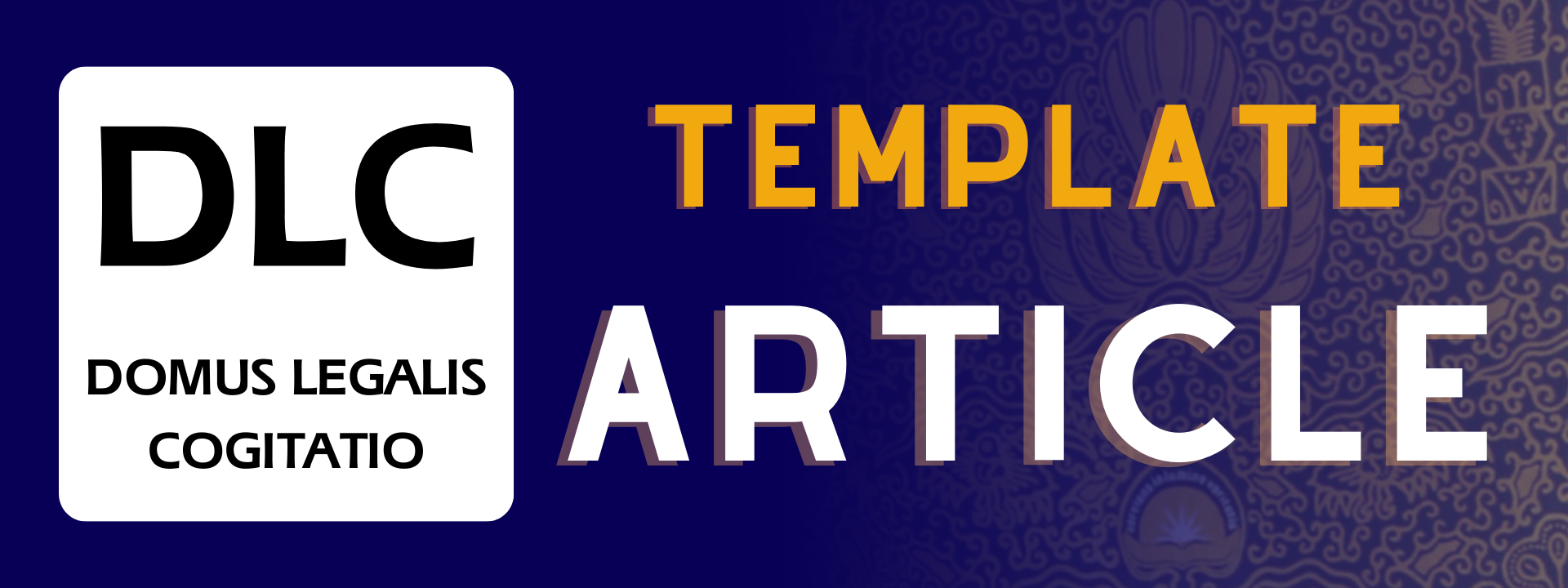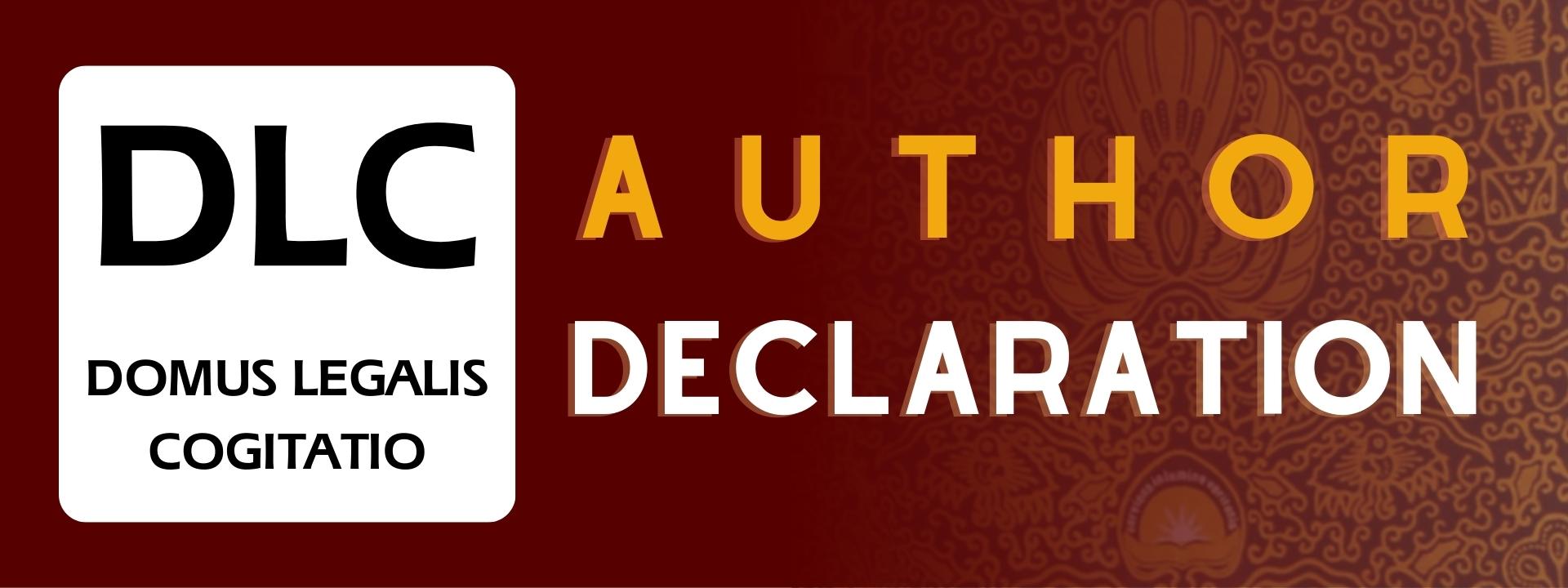COURT DECISION NUMBER 6/PID.SUS-TPK/PN PGP IN THE PERSPECTIVE OF THE JUSTICE THEORY ESPECIALLY ACCORDING TO THOMAS HOBBES
DOI:
https://doi.org/10.24002/dlc.v2i2.10402Keywords:
Justice Theory, Obstruction of Justice, Thomas HobbesAbstract
This study raises the problem that the Pangkalpinang District Court Decision Number 6/Pid.Sus-TPK/PN Pgp against the crime of obstruction of justice in the crime of corruption is considered contrary to the value of justice, because the sanctions imposed on the defendant with the losses suffered by the state are not balanced. Based on the gap between legal norms and legal facts that have been stated, this research aims to criticize the decision through the perspective of the theory of justice according to Thomas Hobbes, in addition to discussing it from the perspective of social justice theory and the purpose of punishment, especially integrative theory. This research used normative juridical legal research methods with a conceptual approach that is connected based on secondary legal materials, namely the theory of justice put forward by Thomas Hobbes. The results of this research stated that the Pangkalpinang District Court Decision Number 6/Pid.Sus-TPK/PN Pgp did not fulfill the criteria of the theory of justice stated by Thomas Hobbes, which states that the judge must consider the public interest harmed by Toni Tamsil's actions. The decision also contradicts the integrative theory, which emphasizes that punishment aims to avenge the perpetrator's actions of the crime and a preventive effort so that the crime does not recur. On the other hand, the decision also hurts the social justice aspect in society and is contrary to the state foundation of Pancasila, namely social justice for all Indonesian people.
References
Books
Atmadja, et.al., Sosiologi Korupsi: Kajian Multiperspektif, Integralistik dan Pencegahan, Jakarta: Prenadamedia Group, 2019.
Muhaimin, Metode Penelitian Hukum, Mataram: Mataram University Press, 2018.
Marzuki, Peter Mahmud, Teori Hukum, Jakarta: Kencana, 2020.
Sabbagh, Clara, and Manfred Schmitt (eds.), Handbook of Social Justice Theory and Research, New York: Springer, 2016.
Syariffuddin, M., Prinsip Keadilan dalam Mengadili Perkara Tindak Pidana Korupsi: Implementasi Perma Nomor 1 Tahun 2020, Jakarta: Kencana, 2020.
Journals Articles
Andini, et al., “Problematika Delik Obstruction of Justice dalam Tindak Pidana Korupsi di Indonesia,” Alauddin Law Development Journal (ALDEV) 5, no. 3 (2023): 553, https://doi.org/10.24252/aldev.v5i3.37894.
Arfiani, et al., “Problematika Penegakan Hukum Delik Obstruction of Justice dalam Undang-Undang Pemberantasan Tindak Pidana Korupsi,” UNES Journal of Swara Justisia 6, no. 4 (2023): 516, https://doi.org/10.31933/ujsj.v6i4.294.
Assauri, et al., “Teori Keadilan dan Moralitas,” Pendas: Jurnal Ilmiah Pendidikan Dasar 9, no. 4 (2024): 215–216, https://doi.org/10.23969/jp.v10i02.20482.
Candra, et al., “Sanksi Kebiri dalam Perspektif Penologi,” al-Jinâyah: Jurnal Hukum Pidana Islam 7, no. 2 (2021): 12–18, https://doi.org/10.15642/aj.2021.7.2.436-462.
Firmansyah, and Aldi, “Penjatuhan Sanksi Pidana kepada Pelaku Penggandaan Hak Cipta Buku sebagai Upaya Pemberantasan Penggandaan Buku di Indonesia,” Jurnal Esensi Hukum 4, no. 2 (2022): 188–189, https://doi.org/10.35586/esh.v4i2.170.
Kastowo, et al., “Chat GPT from Educational, Legal and Ethical Perspectives in Indonesia,” Revista de Gestão Social e Ambiental 18, no. 7 (2024): 4–5, https://doi.org/10.24857/rgsa.v18n7-071.
Kusumawardhani, et al., “Dasar Konseptual dan Implementasi Restorative Justice oleh Polri untuk Mewujudkan Tujuan dan Fungsi Hukum (Kepastian, Keadilan dan Kemanfaatan),” UNES Law Review 6, no. 2 (2023): 4201–4202, https://doi.org/10.31933/unesrev.v6i2.1025.
Maemanah, et al., “Relevansi Filsafat Hukum dalam Pemahaman Konsep Keadilan,” Jurnal Bimbingan & Konseling Keluarga 6, no. 3 (2024): 231–233, https://doi.org/10.47467/as.v6i3.6516.
Mansyah, et al., “Menghilangkan Alat Bukti oleh Penyidik Tindak Pidana Korupsi sebagai Upaya Obstruction of Justice,” Ekspose: Jurnal Penelitian Hukum dan Pendidikan 18, no. 2 (2020): 877, https://doi.org/10.30863/ekspose.v18i2.
Mayrachelia, et al., “Karakteristik Perbuatan Advokat yang Termasuk Tindak Pidana Obstruction of Justice Berdasarkan Ketentuan Pidana,” Jurnal Pembangunan Hukum Indonesia 4, no. 1 (2022): 124–126, https://doi.org/10.14710/jphi.v4i1.121-1322.
Muhammad, and Abdul Aziz, “Ancaman Pidana Mati dalam Perspektif Tujuan Pemidanaan,” Al-Qisth Law Review 7, no. 1 (2023): 9–12, https://doi.org/10.24853/al-qisth.7.1.1-199.
Nur Azisa, et al., “Sistem Pemidanaan Tindak Pidana Narkotika dalam Perspektif Hukum Pidana Nasional,” UNES Law Review 6, no. 3 (2023): 9023–9024, https://doi.org/10.31933/unesrev.v6i3.1840.
Padang, et al., “Keberpihakan Pemidanaan dalam Undang-Undang Nomor 1 Tahun 2023,” Locus: Jurnal Konsep Ilmu Hukum 4, no. 2 (2024): 67–69, https://doi.org/10.56128/jkih.v4i2.348.
Ramadhan, et al., “Tujuan Pemidanaan dalam Kebijakan pada Pembaharuan Hukum Pidana Indonesia,” Rechten: Riset Hukum dan Hak Asasi Manusia 7, no. 5 (2023): 4–6, https://doi.org/10.52005/rechten.v5i1.114.
Ridwan, et al., “Judges' Legal Considerations Obstacles of Justice by Advocates Make It Difficult in Investigations, Prosecutions and Judicial Processes Against Defendants in Corruption Crimes,” Jurnal Hukum Sehasen 10, no. 1 (2024): 339, https://doi.org/10.37676/jhs.v10i1.6005.
Saputro, and Rudri Musdianto, “Penegakan Hukum Lingkungan di Indonesia Ditinjau dari Teori Keadilan Aristoteles,” Jurnal Ilmu Sosial dan Pendidikan (JISIP) 7, no. 1 (2023): 29–30, https://dx.doi.org/10.58258/jisip.v7i1.39700.
Sitorus, et al., “Analisis Pertimbangan Hakim pada Tindak Pidana Penghinaan (Studi Kasus Putusan Pengadilan Cilacap Nomor 159/PID.B/2021/PN CLP),” Diponegoro Law Journal 3, no. 2 (2024): 3, https://doi.org/10.14710/dlj.2024.43674.
Research Result
Indonesia Corruption Watch, “Laporan Hasil Pemantauan Tren Korupsi Tahun 2023” (Research, ICW: Indonesia Corruption Watch, 2024.
Internet
Public Prosecution Service of Indonesia, “Jaksa Agung: Kerugian Negara akibat Korupsi Komoditas Timah yang semula Rp271 Triliun sekarang jadi Rp300 Triliun”, May 29, 2024, https://story.kejaksaan.go.id/berita-utama/jaksaagung-kerugian-negara-akibat-korupsi-komoditas-timah-jadi-rp300-triliun-141575-mvk.html.
Law and Regulations as a Reference
Indonesia, Central Government, Law No. 31 of 1999, regarding Corruption Eradication (1999).
Court Decisions
Corruption Court at the Central Jakarta District Court Decision Number 9/Pid.Sus-TPK/2018/PN Jkt.Pst on the criminal act of obstruction of justice.
Decision of the High Court for Corruption Crimes Number 10/Pid.Sus-TPK/2024/PT Bgl regarding the criminal case of obstruction of justice.
Pangkalpinang District Court Decision No. 6/Pid.Sus-TPK/PN regarding the crime of obstruction of justice with the convicted person Toni Tamsil.










